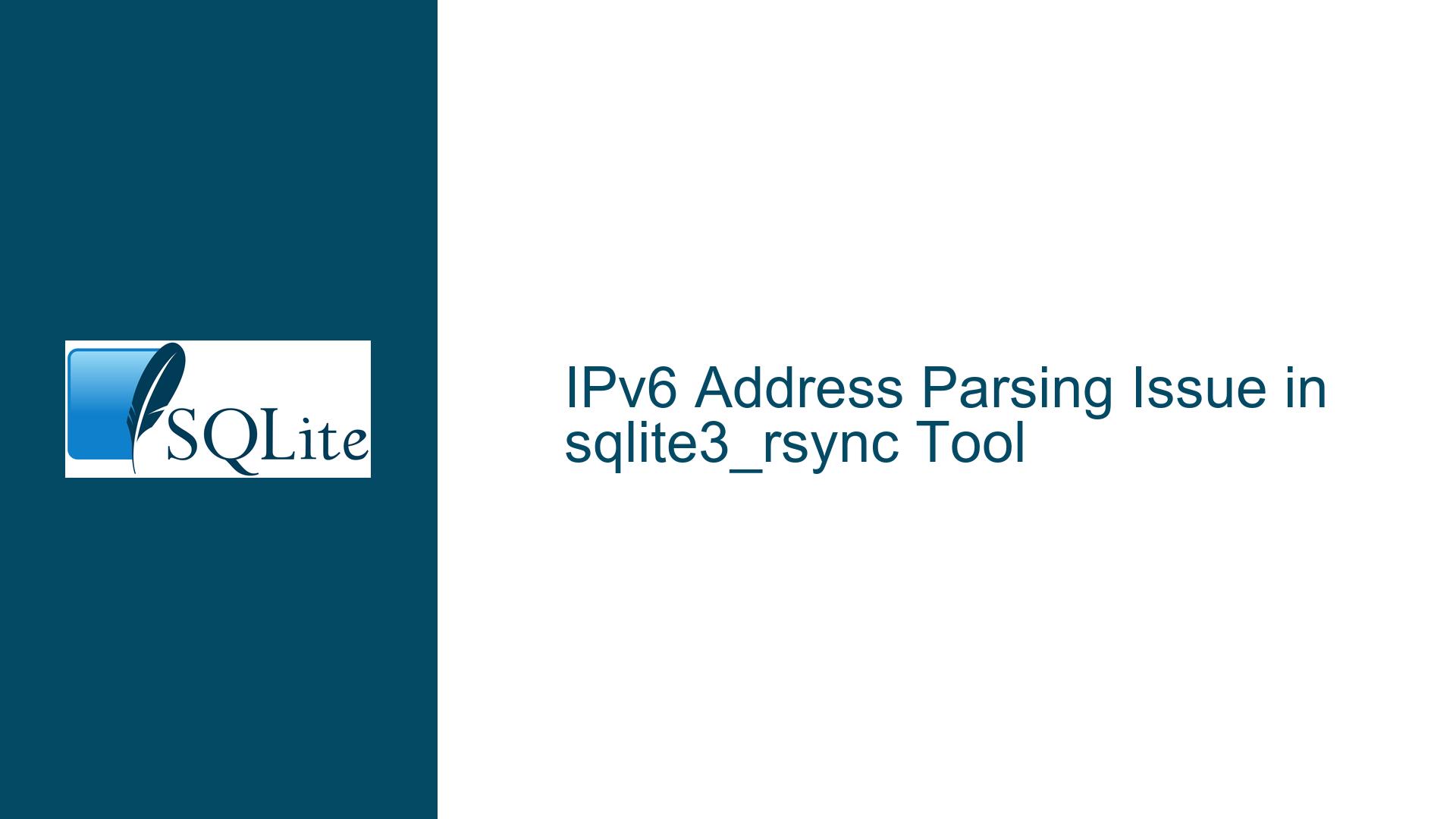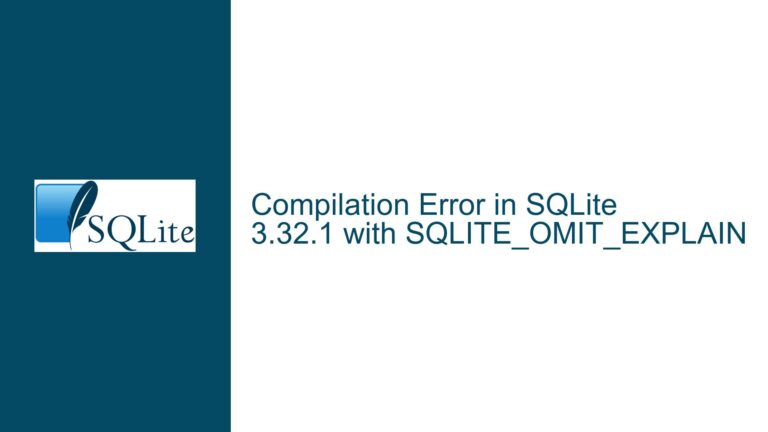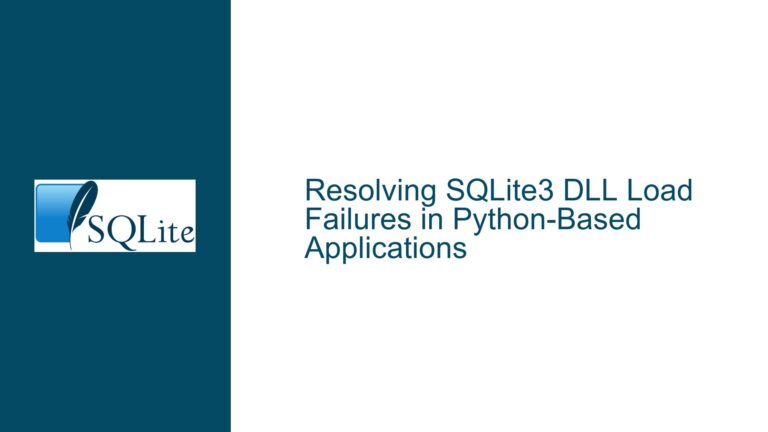IPv6 Address Parsing Issue in sqlite3_rsync Tool
Issue Overview: IPv6 Address Parsing in sqlite3_rsync
The core issue revolves around the inability of the sqlite3_rsync tool to correctly parse and handle IPv6 addresses when they are provided in the standard bracketed format. IPv6 addresses, due to their length and the use of colons as separators, are conventionally enclosed in square brackets to avoid ambiguity, especially when they are used in URLs or network commands. This bracketing is a well-established convention to distinguish the IPv6 address from other components of a URI or command-line argument, such as port numbers or paths.
In the context of sqlite3_rsync, the tool is designed to synchronize SQLite databases between a local machine and a remote server using the rsync protocol over SSH. The command syntax typically includes the remote server’s address, which can be an IPv4 address, a hostname, or an IPv6 address. When an IPv6 address is provided, the expectation is that it should be enclosed in square brackets, as per the standard convention. However, the tool fails to correctly parse the IPv6 address when it is provided in this format, leading to an error where the hostname cannot be resolved.
The error message ssh: Could not resolve hostname [2001: Name or service not known indicates that the ssh command, which is invoked by sqlite3_rsync, is unable to interpret the IPv6 address correctly. This suggests that the parsing logic within sqlite3_rsync does not account for the possibility of an IPv6 address being enclosed in square brackets, and it passes the bracketed address directly to ssh, which does not support this syntax.
The issue is further complicated by the fact that rsync itself does support IPv6 addresses, including those enclosed in square brackets. This discrepancy between rsync and ssh in terms of IPv6 address handling creates a challenge for tools like sqlite3_rsync that rely on both protocols. The tool must correctly parse the IPv6 address, strip the square brackets if necessary, and pass the address to ssh in a format that it can understand.
Possible Causes: Misalignment Between IPv6 Parsing in sqlite3_rsync and SSH
The root cause of the issue lies in the misalignment between how sqlite3_rsync parses IPv6 addresses and how ssh expects them to be formatted. The sqlite3_rsync tool is likely using a simplistic parsing approach that does not account for the possibility of IPv6 addresses being enclosed in square brackets. When an IPv6 address is provided in this format, the tool fails to strip the brackets before passing the address to ssh, resulting in the error.
Another potential cause is the lack of documentation or explicit support for IPv6 addresses in the sqlite3_rsync tool. The absence of clear guidelines on how to specify IPv6 addresses when using the tool can lead to confusion and incorrect usage. Users may assume that the standard bracketed format is supported, only to encounter errors when attempting to use it.
Additionally, the issue may be exacerbated by differences in how various implementations of ssh handle IPv6 addresses. While some versions of ssh may support bracketed IPv6 addresses, others may not, leading to inconsistent behavior across different systems. This inconsistency can make it difficult for tools like sqlite3_rsync to provide a consistent user experience when dealing with IPv6 addresses.
The use of workarounds, such as adding entries to /etc/hosts or creating SSH aliases, highlights the lack of direct support for IPv6 addresses in the tool. While these workarounds can be effective, they are not ideal solutions, as they require additional configuration and maintenance. Users should be able to specify IPv6 addresses directly in the sqlite3_rsync command without needing to resort to such measures.
Troubleshooting Steps, Solutions & Fixes: Enhancing IPv6 Support in sqlite3_rsync
To address the issue of IPv6 address parsing in sqlite3_rsync, several steps can be taken to enhance the tool’s support for IPv6 addresses and ensure compatibility with ssh. These steps include modifying the parsing logic within sqlite3_rsync, providing clear documentation on IPv6 address usage, and exploring alternative approaches to handling IPv6 addresses.
1. Modifying the Parsing Logic in sqlite3_rsync:
The first and most direct solution is to modify the parsing logic within sqlite3_rsync to correctly handle IPv6 addresses enclosed in square brackets. This involves updating the tool’s code to detect the presence of square brackets around an IPv6 address and strip them before passing the address to ssh. The modified parsing logic should be able to distinguish between IPv4 addresses, hostnames, and IPv6 addresses, and handle each case appropriately.
For example, when the tool encounters a command like sqlite3_rsync root@[2001:4860:4860::8888]:/my.db ./my.db, it should recognize [2001:4860:4860::8888] as an IPv6 address, remove the square brackets, and pass 2001:4860:4860::8888 to ssh. This would ensure that the ssh command receives the IPv6 address in a format that it can understand, avoiding the hostname resolution error.
2. Providing Clear Documentation on IPv6 Address Usage:
In addition to modifying the parsing logic, it is important to provide clear and comprehensive documentation on how to specify IPv6 addresses when using sqlite3_rsync. The documentation should explain the standard convention of enclosing IPv6 addresses in square brackets and clarify whether this format is supported by the tool. If the tool does not support bracketed IPv6 addresses, the documentation should provide alternative methods for specifying IPv6 addresses, such as using host aliases or entries in /etc/hosts.
The documentation should also include examples of correct and incorrect usage, along with explanations of why certain formats may not work. This will help users understand the limitations of the tool and avoid common pitfalls when working with IPv6 addresses.
3. Exploring Alternative Approaches to Handling IPv6 Addresses:
If modifying the parsing logic within sqlite3_rsync is not feasible, alternative approaches can be explored to handle IPv6 addresses. One such approach is to use SSH aliases, as suggested in the discussion. By creating an alias for the IPv6 address in the ~/.ssh/config file, users can avoid the need to specify the address directly in the sqlite3_rsync command. This approach has the added benefit of simplifying the command syntax and making it easier to manage multiple remote servers.
Another alternative is to use a wrapper script around sqlite3_rsync that handles the parsing of IPv6 addresses and passes the correct format to ssh. The wrapper script could detect the presence of square brackets, strip them if necessary, and then invoke sqlite3_rsync with the modified address. This approach would allow users to continue using the standard bracketed format for IPv6 addresses without requiring changes to the sqlite3_rsync tool itself.
4. Testing and Validation:
Once the necessary changes have been made to the parsing logic or alternative approaches have been implemented, it is crucial to thoroughly test the tool to ensure that it works correctly with IPv6 addresses. Testing should include various scenarios, such as using different formats for IPv6 addresses, specifying port numbers, and working with different versions of ssh. The goal is to ensure that the tool behaves consistently across different environments and that users can reliably synchronize SQLite databases over IPv6 networks.
5. Community Feedback and Iteration:
Finally, it is important to gather feedback from the community and iterate on the solution based on user experiences. Users who encounter issues with IPv6 address parsing should be encouraged to report their findings, and the development team should be responsive to these reports. By incorporating feedback from the community, the tool can be continuously improved to better support IPv6 addresses and meet the needs of its users.
In conclusion, the issue of IPv6 address parsing in sqlite3_rsync can be effectively addressed by modifying the tool’s parsing logic, providing clear documentation, exploring alternative approaches, and conducting thorough testing. By taking these steps, the tool can be enhanced to support IPv6 addresses in a way that is consistent with established conventions and compatible with ssh. This will improve the user experience and ensure that sqlite3_rsync remains a reliable tool for synchronizing SQLite databases over IPv6 networks.






